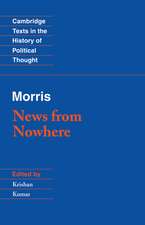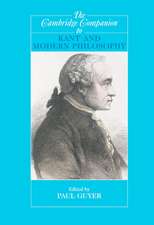Fear of Enemies and Collective Action
Autor Ioannis D. Evrigenisen Limba Engleză Paperback – 8 noi 2009
| Toate formatele și edițiile | Preț | Express |
|---|---|---|
| Paperback (1) | 233.89 lei 6-8 săpt. | |
| Cambridge University Press – 8 noi 2009 | 233.89 lei 6-8 săpt. | |
| Hardback (1) | 641.42 lei 6-8 săpt. | |
| Cambridge University Press – 2 dec 2007 | 641.42 lei 6-8 săpt. |
Preț: 233.89 lei
Nou
Puncte Express: 351
Preț estimativ în valută:
44.76€ • 46.17$ • 37.35£
44.76€ • 46.17$ • 37.35£
Carte tipărită la comandă
Livrare economică 26 martie-09 aprilie
Preluare comenzi: 021 569.72.76
Specificații
ISBN-13: 9780521177870
ISBN-10: 0521177871
Pagini: 254
Dimensiuni: 152 x 229 x 15 mm
Greutate: 0.34 kg
Editura: Cambridge University Press
Colecția Cambridge University Press
Locul publicării:New York, United States
ISBN-10: 0521177871
Pagini: 254
Dimensiuni: 152 x 229 x 15 mm
Greutate: 0.34 kg
Editura: Cambridge University Press
Colecția Cambridge University Press
Locul publicării:New York, United States
Cuprins
Prologue; Introduction; 1. Negative association; 2. 'Carthage must be saved'; 3. Enemies at the gates: Machiavelli's return to the beginnings of cities; 4. The enemy of my enemy is my friend: negative association and reason of state; 5. Survival through fear: Hobbes's problem and solution; 6. Hobbism; 7. The politics of enmity; Epilogue.
Recenzii
"This book may be read from two complementary and enlightening perspectives: as a history of political thought centered on the role played by fear in group formation, and as a theoretical treatise on 'negative association', that is, collective action based on a principle of identification in opposition to others. The first contribution of this insightful inquiry is to document a common thread running from Thucydides, Aristotle, and Sallust to Carl Schmitt and Hans Morgenthau, with Machiavelli and Hobbes as major moments. Through the lens of a rich, careful, and original analysis, Evrigenis shows that the perception of external threats as crucial to group and state preservation is not the exclusive domain of modern political thought … Evrigenis’s textual exegesis here is illuminating … Clearly, this book captures a powerful motivation underlying rallying effects, various processes of group emergence in the realm of domestic politics, and alliance formation in the realm of international relations."
Ivan Ermakoff, University of Wisconsin, Madison, Perspectives on Politics
"Contemporary political theorists have not found a great deal to say about issues of insecurity and conflict. It is one of the chief merits of Ioannis Evrigenis' enjoyable book that it restores those issues to the centre of attention … Evrigenis charts the emergence and development of the concept of negative association through metus hostilis across the history of political thought. Six of the seven short chapters are dedicated to this enterprise and manage to engage a quite breathtaking array of thinkers … Evrigenis’ eye is on the big picture, and the image that emerges is very interesting indeed."
Derek Edyvane, University of Leeds, Political Studies Review
"Far from imposing a disciplinary continuity of negative association amongst the great thinkers, Evrigenis instead contextualizes the historical conditions each wrote within. Indeed, Fear of Enemies is in certain portions (such as Chapter 7) just as much intellectual history and biography as it is a work of international political theory. This of course makes the major thesis more compelling - despite the variety of experiences for each theorist or philosopher, they all discovered a common referent, and then served to captain this ship of negative association and steer it towards a particular direction depending upon the time and place of their writing. Thus, the referent of negative association found in Fear of Enemies and Collective Action may serve as both a heuristic device and a pedagogical frame, the latter of which to train graduate students attempting to sort out the realist tradition’s origins and impact upon IR theory today."
Brent J. Steele, University of Kansas, International Studies Review
Ivan Ermakoff, University of Wisconsin, Madison, Perspectives on Politics
"Contemporary political theorists have not found a great deal to say about issues of insecurity and conflict. It is one of the chief merits of Ioannis Evrigenis' enjoyable book that it restores those issues to the centre of attention … Evrigenis charts the emergence and development of the concept of negative association through metus hostilis across the history of political thought. Six of the seven short chapters are dedicated to this enterprise and manage to engage a quite breathtaking array of thinkers … Evrigenis’ eye is on the big picture, and the image that emerges is very interesting indeed."
Derek Edyvane, University of Leeds, Political Studies Review
"Far from imposing a disciplinary continuity of negative association amongst the great thinkers, Evrigenis instead contextualizes the historical conditions each wrote within. Indeed, Fear of Enemies is in certain portions (such as Chapter 7) just as much intellectual history and biography as it is a work of international political theory. This of course makes the major thesis more compelling - despite the variety of experiences for each theorist or philosopher, they all discovered a common referent, and then served to captain this ship of negative association and steer it towards a particular direction depending upon the time and place of their writing. Thus, the referent of negative association found in Fear of Enemies and Collective Action may serve as both a heuristic device and a pedagogical frame, the latter of which to train graduate students attempting to sort out the realist tradition’s origins and impact upon IR theory today."
Brent J. Steele, University of Kansas, International Studies Review
Notă biografică
Descriere
Explores the way the fear of enemies shapes political groups and helps to preserve them in times of crisis.















